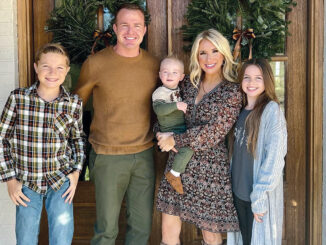
Panic. Stress. Worry. These three words describe how I feel about the stage of parenting I’m currently in. My middle child, Savannah, becomes a teenager this month. Wow! Now I have two teenagers I’m trying to raise. The thought of one teenager incited a list of emotions that wreaked havoc on my mental state. But now I will have two teenage daughters to worry about.
It’s hard to believe that a “short” 13 years ago we were bringing our precious baby girl home from the hospital. Just like it was with her sister, I was either too naive or too arrogant at the time to be worried about raising her. Honestly, the baby and child stages haven’t been a big stress point for me. (Although my youngest, Sadie-Rae, does seem to be changing the game quite a bit when it comes to this younger stage.) That’s not to say that I don’t ever worry about my child-rearing skills at the younger stages; it’s just that I’m comfortable with my parenting philosophies at this stage.
The teenage years, however, have me so freaked out I can’t sleep at night. The teenage years bring on a whole new world and with it new and different issues. I know it won’t all be terrible, but I also know it won’t all be fun. Teenage angst is a real thing and, neurologically speaking, teenagers’ brains are literally breaking down and reconstructing. The limbic portion of their brain, the part of the brain that controls the emotions, is running on overload while their frontal lobes, the part of the brain that makes decisions, aren’t mature enough to keep up, so it literally shuts down for brief periods. How am I supposed to parent that?
It’s not just the whole moody teenager thing that worries me. It’s how do I prepare my teenager for this world we live in? There is so much I want her to know, and so many things I want to protect her from. The problem is I know that I can only tell her a small portion and she will have to learn the rest on her own. Have I given her the tools to do this? I think so, but how can I be sure? Will Savannah come to me for guidance, trusting that I will love her always and have her best interest in mind, or will she rebel and distance herself from me?
Another point of worry is the fact that you need to parent teenagers differently than you do younger children. Of course, as our kids get older, we want to give them more freedom and more responsibility. We want to stretch them and allow them to grow into the best versions of themselves. We have to become the guide more than the commander; someone who is always there but not always making the decisions for them.
This will be challenging for me. I am a take-charge type of mom and it’s not going to be easy for me to step back and let Savannah make her own decisions, especially if I disagree with them. (I mean this only to the point that is acceptable for a girl her age to make, of course. She is a long way from being an adult so we will only allow her the freedom to make those decisions that are appropriate for her to make.) However, I know that allowing Savannah to have more of that decision-making responsibility will better prepare her for life as an adult. (And, hopefully, help her make wise decisions when those risky teenage moments arise.)
The research done on the adolescent brain is incredibly interesting and I think knowing some of that information will help my husband and I to be better parents to our kids as they become teenagers. For example, did you know that teenagers handle stress worse than younger children and adults? Hopefully, I will remember that tidbit of information the next time Savannah says to me that she is overwhelmed. I want to be able to wrap her in my arms at that point, understanding that at that particular moment she really can’t handle it, rather than bristling and telling her she is being dramatic.
One of my goals as a mom is to make sure my kids know I love them unconditionally. This doesn’t mean that I’m their buddy or BFF at this stage of the game. (I could write a whole article on that topic.) Instead, it means that I want my children to know I love them even when they mess up (because they will) and I want them to know I love them even when I disagree with their decisions.
I think this gets more challenging as children become teenagers because they are constructing who they are and they want others to like and accept who they are. Ironically, at this stage of brain development, teenagers can’t read facial expressions accurately. Studies have been done that show teenagers don’t have enough finished brain development in certain areas of the brain to tell the difference in a neutral facial expression and an angry one. This is why your teenager may often be asking you why you are so upset with them.
I know we will have some ups and downs through the teen years. I know I will make plenty of parenting mistakes, but I pray they will be minor ones and that I can guide each of my children through those crazy years so on the other side of them my kids can reach their full potential.
The teen years have not been too rough so far with my oldest, Cadence – but I know they are two very different kids and I worry I might still get it wrong. I pray Mike and I will be able to usher all our children into adulthood relatively unscathed. I pray I will be able to give Savannah all she needs.
I love you baby girl! You have been such a blessing to me and your daddy. Happy thirteenth birthday – I hope this year is full of wonder for you!
-by Kari Carr
About the Author: Kari doesn’t claim to be a parenting expert, just a mom to her four wonderful children and wife to the love of her life, Mike. Together they move through the ups and downs of raising kids in this crazy world. She struggles through the trials and joys of raising children from the ages of two to 15 years old. Kari received her degree at WKU and taught public middle school music and choir for seven years before opening her own business, Sound Beginnings Musikgarten & Vocal Studio. She lives and works in Bowling Green.






